Ah, the Nafnaþulur. If you’ve delved into the Prose Edda, you might have come across this term, or perhaps you’ve missed it entirely, given its tendency to be omitted in many modern translations. But let’s journey back in time and uncover the mysteries of this intriguing subsection.
Origins and Significance
The Nafnaþulur, pronounced [ˈnɑvnɑˌθulur], is a subsection nestled within the Prose Edda, specifically as the concluding part of the Skáldskaparmál. Now, if you’re wondering what this list entails, it’s essentially a poetic directory. It enumerates names that can be employed in poetry for a plethora of items, ranging from gods and jötnar (giants) to everyday objects like animals and weapons.
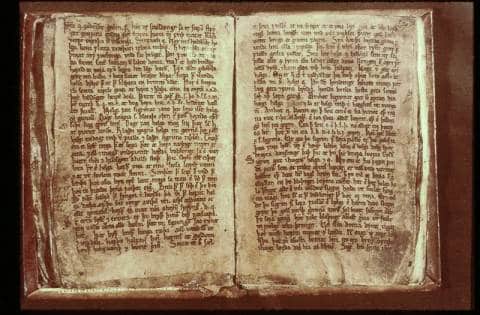
Interestingly, these verses don’t appear in all manuscripts of the Edda. They often stand alone, suggesting they might have been a subsequent addition to Snorri’s original masterpiece. Some even theorize that they could have been one of the sources for Snorri’s composition. Due to their ambiguous origin and placement, they’re frequently left out of contemporary editions and translations of the Edda. A pity, really, considering the depth they add to the poetic landscape of the time.
What’s in a Name? Understanding Nafnaþulur
The term “Nafnaþulur” might sound complex, but it’s essentially about names and designations. Within the realm of Old Norse poetry, poets often sought alternative expressions to enrich their verses, and that’s where heiti and kennings come into play.
A heiti (pronounced [hɛitɪ]) is a poetic synonym, a fancier or more ornate term used in place of the standard word. Think of it as the poetic equivalent of saying “steed” instead of the more mundane “horse”. For instance, in Old Norse, while “hestr” means “horse”, a poet might opt for “jór”, adding a layer of elegance to the verse.
But wait, there’s more! Enter kennings. While heiti are straightforward synonyms, kennings are a tad more intricate. They’re poetic circumlocutions, often formed as phrases or compound words. For example, while “mækir” is a heiti for “sword”, “grand hlífar” (bane of shield) and “ben-fúrr” (wound-fire) are kennings for the same object. It’s a beautiful way of painting a vivid picture with words, don’t you think?
Interestingly, Snorri Sturluson, the mind behind much of our understanding of Old Norse poetry, had a broader perspective on heiti. For him, simple words, whether poetic or not, were termed as ókend heiti (unqualified terms). In contrast, the more elaborate circumlocutions were dubbed kend heiti (qualified terms), which we now recognize as kennings.
In Conclusion
The Nafnaþulur, with its rich tapestry of names and poetic devices, offers a fascinating glimpse into the world of Old Norse poetry. It’s a testament to the creativity and depth of expression that poets of the time possessed. While it might be overlooked in some modern translations, its essence and influence remain undeniable. So, the next time you come across an Old Norse verse, take a moment to appreciate the intricate dance of heiti and kennings, and remember the often-forgotten Nafnaþulur that celebrates them.
Nafnaþulur
Sea-Kings
1. Atli, Fróði,
Áli, Glammi,
Beiti, Áti,
and Beimuni,
Auðmundr, Guðmundr,
Atall and Gestill,
Geitir, Gauti,
Gylfi, Sveiði.
2. Gæir, Eynefir,
Gaupi and Endill,
Skekkill, Ekkill,
Skefill and Sölvi,
Hálfr and Hemlir,
Hárekr and Gorr,
Hagbarðr, Haki,
Hrauðnir, Meiti.
3. Hjörólfr and Hrauðungr,
Högni, Mýsingr,
Hundingr, Hvítingr,
Heiti, Mævill,
Hjálmarr, Móir,
Hæmir, Mævi,
Róði, Rakni,
Rerr and Leifi.
4. Randver, Rökkvi,
Reifnir, Leifnir,
Næfill, Ræfill,
Nóri, Lyngvi,
Byrvill, Kilmundr,
Beimi, Jórekr,
Ásmundr, Þvinnill,
Yngvi, Teiti.
5. Virfill, Vinnill,
Vandill, Sölsi,
Gautrekr and Húnn,
Gjúki, Buðli,
Hómarr, Hnefi,
Hörvi, Sörvi.
I have assembled no more
sea-kings.
Giants I
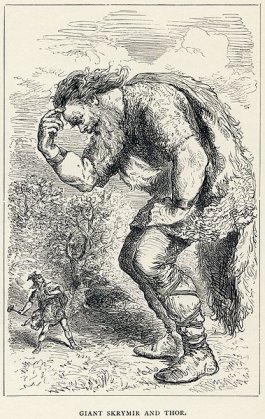
6. I will make a listing
of the giants;
Ymir, Gangr and Mímir,
Iði and Þjazi,
Hrungnir, Hrímnir,
Hrauðnir, Grímnir,
Hveðrungr, Hafli,
Hripstoðr, Gymir.
7. Hraðverkr, Hrökkvir,
and Hástigi,
Hræsvelgr, Herkir
and Hrímgrímnir,
Hymir and Hrímþurs,
Hvalr, Þrígeitir,
Þrymr, Þrúðgelmir,
Þistilbarði.
8. Geirröðr, Fyrnir,
Galarr, Þrívaldi,
Fjölverkr, Geitir,
Fleggr, Blapþvari,
Fornjótr, Sprettingr,
Fjalarr, Stígandi,
Sómr and Svásuðr,
Svárangr, Skrati.
9. Surtr and Stórverkr,
Sækarlsmúli,
Skærir, Skrýmir,
Skerkir, Salfangr,
Öskruðr and Svartr,
Önduðr, Stúmi,
Alsvartr, Aurnir,
Ámr and Skalli.
10. Köttr, Ösgrúi
and Alfarinn,
Vindsvalr, Víparr
and Vafþrúðnir,
Eldr and Aurgelmir,
Ægir, Rangbeinn,
Vindr, Víðblindi,
Vingnir, Leifi.
11. Beinviðr, Björgólfr
and Brandingi,
Dumbr, Bergelmir,
Dofri and Miðjungr,
Nati, Sökmímir.
Now have all been recounted
the loathsome
giants’ names.
Troll-Wives
12. Of the troll-wives I shall
tell the names
Gríðr and Gnissa,
Grýla, Brýja,
Glumra, Geitla,
Gríma and Bakrauf,
Guma Gestilja,
Grottintanna.
13. Gjálp, Hyrrokkin,
Hengikefta,
Gneip and Gnepja,
Geysa, Hála,
Hörn and Hrúga,
Harðgreip, Forað,
Hryggða, Hveðra
and Hölgabrúðr.
14. Hrímgerðr, Hæra,
Herkja, Fála,
Imð, Járnsaxa,
Íma, Fjölvör,
Mörn, Íviðja,
Ámgerðr, Simul,
Sívör, Skríkja,
Sveipinfalda.
15. Öflugbarða
and Járnglumra,
Ímgerðr, Áma
and Járnviðja,
Margerðr, Atla,
Eisurfála,
Leikn, Munnharpa
and Myrkriða.
16. Leirvör, Ljóta
and Loðinfingra,
Kráka, Varðrún
and Kjallandi,
Vígglöð, Þurbörð;
we will name
finally Rýgi
and Rifingöflu.
Thor
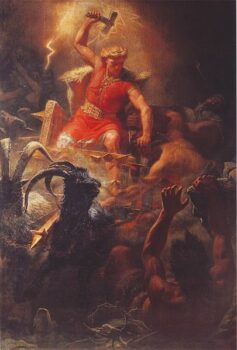
17. Thor is called Atli
and Ásabragr,
he is Ennilangr
and Eindriði,
Björn, Hlórriði
and Harðvéorr,
Vingþórr, Sönnungr,
Véoðr and Rymr.
Sons of Óðinn
18. Sons of Óðinn are:
Baldr and Meili,
Víðarr and Nepr,
Váli, Áli,
Þórr and Hildólfr,
Hermóðr, Sigi,
Skjöldr, Yngvi-Freyr
and Ítreksjóð,
Heimdallr, Sæmingr,
Höðr and Bragi.
Giants II
19. And here are further
names of giants:
Eimgeitir, Verr,
Ímr, Hringvölnir,
Viddi, Víðgrípr,
Vandill, Gyllir,
Grímnir, Glaumarr,
Glámr, Sámendill.
20. Vörnir, Harðgreipr
and Vagnhöfði,
Kyrmir, Suttungr
and Kaldgrani,
Jötunn, Óglaðnir
and Aurgrímnir,
Gillingr, Gripnir,
Gusir, Ófóti.
21. Hlói, Ganglati
and Helreginn,
Hrossþjófr, Durnir,
Hundálfr, Baugi,
Hrauðungr, Fenrir,
Hróarr and Miði.
Aesir
22. Now I shall list
the Æsir’s names:
There are Yggr and Thor
and Yngvi-Freyr,
Víðarr and Baldr,
Váli and Heimdallr,
there are Týr and Njörðr,
and next I list Bragi,
Höðr, Forseti,
the last here is Loki.
Goddesses
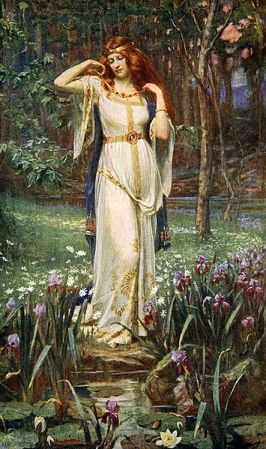
23. Now shall the goddesses
all be named:
Frigg and Freyja,
Fulla and Snotra,
Gerðr and Gefjon,
Gná, Lofn, Skaði,
Jörð and Iðunn,
Ilmr,1 Bil, Njörun.
24. Hlín and Nanna,
Hnoss, Rindr and Sjöfn,
Sól and Sága,
Sigyn and Vör.
There is Vár, and Syn
needs to be named,
and Þrúðr and Rán
are enumerated next after them.
25. Now, Freyja wept
gold for Óðr.
Names of hers are
Hörn and Þrungva,
Sýr, Skjalf and Gefn,
and likewise Mardöll.
Her daughters are
Hnoss and Gersimi.
Valkyries
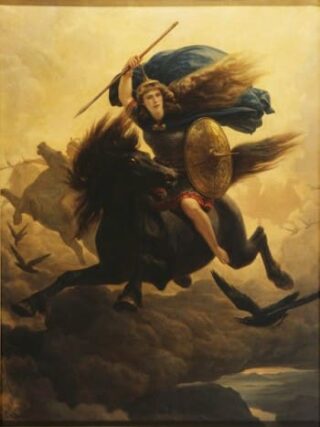
26. And these others
are Óðin’s maidens:
Hildr and Göndul,
Hlökk, Mist, Skögul,
then are Hrund and Eir,
Hrist, and Skuld listed.
Those who shape need
are known as norns;
Nift and Dísi
I will now name.
A Woman
27. Gentlewoman, bride, lady,
proud lady, spark,
woman, dame, female,
sweet thing, widow,
housewife, wife and sweetheart,
slender lady, matron,
bondswoman, haughty one and war-widow,
maiden and old lady.
A Man
28. Time it is to tell
the terms for men:
poets and husbands,
men and bachelors,
stallions, yeomen,
braves, males,
a company, masters
and landowners.
29. Heroes, thanes,
stalwarts, gentry,
menfolk and seamen,
soldiers, holders,
fellow travelers, a household,
a band, hardymen,
champions and men of valor,
fighters, mates.
30. Population and folk
and bosses,
troops and hosts,
the common people and hordes,
the people, dandies,
lions and travelers,
a gentle, a noble,
a great man, a sage.
31. There’s the illustrious man
and the gold-giving lord,
wealth-amassers
and show-offs,
an army and a division
and chieftains,
the nation and the county,
the assembly, the populace.
32. Now there’s the throng and the crowd,
the village, good people,
the household and servants,
the down-chinned, men of courage,
a crew and a gathering,
a garrison, dandies,
beings and “brians”.
33. And there are further
terms for people,
the bodyguard and mercenaries
and housecarls,
a personal army and a couple,
if I list them all,
confidant and buddy
and counselor.
34. Housemates,
staffers,
bench-mate and acquaintance,
fellows and followers,
there are partners
and kinsmen together,
friend, hug-buddy,
the king’s guard, men.
35. Great-grandfather and relative,
grandfather, son, father,
brother, twin,
bro and sib,
baby, child, nephew
and heir,
there are full-blood brothers
and branches from the tree.
36. Offspring, clansman,
relation and kid,
gentleman and a lineage,
kinsman, a line,
youth, buddy,
in-law and secret-sharer,
clan, family line,
dependent and swain.
37. Drinking buddies
and brothers-in-law,
progeny there are
and pillar of the family,
there are council-member
and counsel-giver,
servitors, thralls,
servants, laborers,
workmen, slaves3
and serfs.
Battle
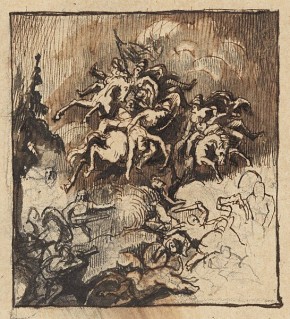
38. These are the heiti:
din and tumult,
clangor, spear-slaughter
and spear-wielding,
strife and a clash,
shield-violence and shield-stir,
the rush and the onslaught,
victory, the campaign, a fight.
39. The fray, murder and slaughter,
an attack, direful enmity and terror
clamor, shock, war,
action and a bout;
there are battle
and fate’s decision,
storm and pugnaciousness,
army-movement, a thunderclap.
A Sword
40. I will recount
the heiti for swords:
blade and Hrotti,
hewer, Dragvandil (draw-wand),
Gróa (grower), Gram (wrath), screamer,
resounding and end-scored,
scythe and polisher,
honor, light ray.
41. Rogue, cutter, metal,
Skrýmir, Laufi (leaf),
ale-glory, halbard
and wormstick,
leg-biter and bull
and Leifnir’s ruin,
war-bared, Hneitir (slicer)
and sea-raked.
42. Lotti (reducer), gushmaker,
stabber, seax,
hand weapon, hand grip
and Mistletoe,
steel, throe-giver and striker
and middle-decorated,
Fetbreid (broad-track), gate-fire
and life-quencher.
43. Wavy, threaded,
corpse-pain and brand,
man, wolf,5 slaughterer,
wind-bright and torture,
ash, sorrow-wader,
sharp of edges,
swooper and hideous darter,
hall-fence, grip.
44. Inciter, head-sharp,
skull-breaker,
carrion-Gaut, army-shining
and flesh-Mímir,
wound-opener, reverser,
surf-raiser, burnished,
gleam, lacerator,
reducer, gate-fire.
45. Mimungr and death
and Speech-Witness,
treasure, corpse-enclosed,
crane, twist-stick,
trooper, millstone-biter,
beam of light, hardness,
witness, ripper,
barrier-breaker.
46. Mocker, pale-maker,
dismisser, notcher,
luckbringer, Skilfingr (trembler),
polished, tearer,
rupturer, whitey,
Bæsingr (bastard), Tyrfingr (tarry),
gobbler and hewer,
and nightbringer will be found here.
47. Fire and hand-resounding,
long-sharp and flame,
eagle and terrorizer
and Naglfari (riveted),
reclaimer, Mörnir (jabber),
breeze6 and diminisher,
blaze and long-neck,
stormy, defiler.
48. Feller, pale,
Fáfnir (embracer), piercer,
battler, reeking,
offspring, bender,
winner, polisher,
swallower, cutter and dead man,
Goin (merry), guest-Moin (moor-guest),
mocker, thunderer, Níðhöggr (mean-striker).
49. Point, blood-band
and wound-knuckles,
blood interlace, bloodcasting
and bloody eddy,
blood opening, feinter
and blood-grip,
restless caster and brand,
edge-strips, battle.50. Howler, blade
and Ölröð’s gift,
mark, battle-edge
and missed aim,
fringe and shaver,
under-dragger,
outlaw, Kaldhamar’s gift,
hilt and hard shoulder.
51. Sword and clamorer
and trusty nail,
clinch, victory-knob,
boss and tang,
grip, hew-father
and middle-pierce.
An Axe
52. Axe, earth-horn
and iron-blade,
opener and sideways shover,
cutter and hatchet,
power-span, Gnepja (jutter),
ogress and Fála (frightener),
spiked and bulging,
barbed axe and Vígglöð (battle-bright),
chopper and extended,
there is the wretch’s horn,
this is the called the last word7
of the names of axes.
A Spear
53. Dart, spear and stinger,
leaning-post, lance and javelin,
swifty, pike and tirer,
halberd, carrion-blade,
throwing spear, shaft, borer,
missile, Irish halberd,
gavelock, fluke,
Gungnir, Poitier shaft.
An Arrow
54. Arrow is also shaft,
point, white-shot,
Fenja and sleet-fall,
vane, whistling shot,
fletching, bale, bolt,
spike and Hremsa (clutch),
utility vane and piercer,
equipment and shafted weapon.
55. Flying fire, swift-flyer,
grass-stalk and lancet,
mention will be made of finder
and Gusi’s smithing,
Jólf’s smithings there are,
but the last word is whizzer.
A Bow
56. Elm, arc, bow,
yew and double-wood,
switch, glaring and noisy,
honorable, scooped-clanger.
And I speak the names also
of all weapons collectively:
iron, shaft and striker,
steel and spear.
A Shield
57. Shield, the beset man’s hall,
protector, hall-binder,
bender, lee-edge
and buckler,
hand-staff, targe,
wind-horse and shelter,
wide-pale, etched thing,
battle-blithe and linden.
58. Resounding, dew-scraper
and gem-shelterer,
battle-light, stony
and battle-shelter,
cooled and board,
defiled, border,
little stern, beaky,
sheer, double boarded,
battler and roarer,
everlasting, shining,
ring, fair-dark,
carried, middle-protector.
A Helmet
59. I shall tell the terms
for Hropt’s hood:
helmet, gold-pale,
cover, slaughter-rimy,
stone-rimy, hollowed
and shelterer,
life-protector, fine-looker
and eager-brown
Hildigöltr (battle-boar), casque,
battle-crest and warmer,
cowl, frightener,
shining, dome.
A Mailshirt
60. Byrnie, arriver, helmet-ringer,
sark and close,
cold one, Finnsleif (Finn’s legacy),
fare-to-battle, hold-fast, hindrance
and blood-toy.
The Sea
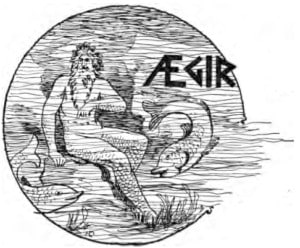
61. Sea, ever-lying,
salt, Ægir (ocean), waters,
wetness, briny, calm waters,
dead calm and wave,
resounding, high sea, main,
murmurer, rocker and mere,
sucking, pounding surf, same,
whirlpool, stream and fjord.
62. Sound, inlet, fair faring,
far-sounding and wide expanse,
tempest, home of fishes, breaker,
dusky, flood and surf,
swell, dazzler,
Gymir (engulfer) and flower,
rumbling and restless,
surge, pool, snatcher.
63. Crashing, wake, league,
fishing ground, tidal bay and fishing bank,
water, deep and plunge,
bay, tarn and ditch,
tumult, canal, trout-hole,
stream, rivulet and beck,
channel, well, wellspring,
eddy, torrent and firth.
64. Hefring (heaving), roller,
whitecap and shoals,
Hrönn (casting-up wave), Rán (plunderer), Kölga (cold one)
and Himinglæva (heaven-gleam),
Dröfn (comber), Uðr (wave) and sweller,
Dúfa (deep), Bylgja (billow),
shoal-breaker and wind-wave,
Blóðughadda (bloody-haired).
Rivers
65. Gjöll* (noisy), Glit (glitter), Gera (greedy),
Glóð (glowing) and Valskjálf (carrion shelf)
Ván (hope), Víð* (wide), Vimur,
Ving (meadow?) and Ouse,
Síð (low), South, Freka (demanding),
Sækin (pushy), Einstika (lone-progressing)
Elbe, Rye, Oykill,
Ekin (driven), Rennandi (running).
66. Tyne*, Rhine and Nith,
Thuil, Rimr (rime?), Ysja (bustler),
Don, Ógn (water), Dýna (bog),
Dyn (thunderer), Höllfara (slopping course),
Órun and Brora,
Auðskjálg (easily crossed), Ludd,
Mun (delight), Merkriða (remarkably shaking),
Mein, Saxon Elbe.
67. Tiber, Durn (sluggish), Dvina,
Thames, Vönd (difficult) and Strand,
Marne, Móða (broads), Þrym (noise),
Morn (murrain) and Gotha-Elbe,
Alne, Uðr (wave), Ólga (swell)
and Euphrates,
Ógn (dread), Eiðrennir (isthmus-runner)
and Aberdeen.
68. Rögn, Hrönn (wave) and Raun (test),
Raum-Elbe, Hnipul (drooper),
Hnöpul, Hjálmunlá (helm-shoal),
Humber, Dvina,
Vil (trouble), Vín (wine), Vella (welling),
Valin (respectable?), Semð, Salin (salty?),
Dneipr, Drammen, Strauma (torrent),
Nissan, Mynt (mouthed), Gnapa (jutting).
69. Gilling (resounding) and Nile,
Ganges, Tweed,
Luma, Vervaða,
Loire and Gunnþró* (battle trough),
Iðsvöl* (ever-cold), Vegsvinn (way-swift)*,
Yn, Þjóðmuna*,
Fjörm* (hurrying), Strand and Spey,
and Fimbulþul* (great roaring).
70. Nyt (milk), Hrönn (wave) and Nauð,
Nöt (wet), Slíðr* (punishment) and Hríð* (snow-storm),
Körmt, Leiftr* (lightning) and Armet,
the two Kerlaugs (baths),
Gömul (old), Sylgr* (swallower) and Inn
and Geirvimul (spear-swarming),
Ylgr* (she-wolf), Vöð (ford) and Flóð (flood),
the Jordan comes last.
Fish
71. Salmon and ling
hake, cusk,
sea-trout, milter salmon,
perch and kelt,
lobster, lumpsucker,
milter, halibut,
mackerel, salmon-trout
and gurnard.
72. Silt, pollock, skate,
herring, brown trout and redfish,
codfish and houting,
carp, flounder,
fluke, sturgeon
and sea-scorpion,
mackerel shark, catfish
and Greenland shark.
73. Sea dragon, miller’s thumb
and prawn,
lobster, sand-flounder
and gar pike,
sea scorpion, turbot
and rock crab,
sillung-trout, shellfish,
swordfish and pollack.
74. Codling, coal-fish,
cod, strap-fish,
groundling, pike,
gill-fish, long cod,
eel and carp,
crab, garfish,
dogfish and moonfish,
minnow, sea-urchin.
Whales
75. Buck-whale, pike-whale
and dugong,
dolphin, sea-monster
and porpoises,
ruddy whale, ruddy whale calf,
sperm whale, walrus
and nordcaper.
76. Greenland whale, cow-whale,
narwhal and pilot whale,
humpback, fin-whale
and jut-whale,
bowhead whale, orca
and sei whale,
horse-whale, bottlenose whale,
minke whale and grampus.
A Ship
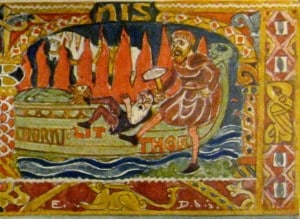
77. Now I will expound
on heiti for ships:
ark, oar-clutch,
ash, Sessrúmnir (roomy-seated),
racing warship, cutter, ship
and Skíðblaðnir,
nave, Naglfari,
rowboat, smack.
78. Freighter, merchant ship,
bow-cold and reindeer,
ridgeback, thole-strap-fixed
hoary-prow,
cruiser, boat and pinnace,
brig, Hringhorni (ringhorn),
craft, keel, longship,
Leifnir, galley.
79. Ring, Gnóð, Freki (greedy),
fast, Móðrói (mind-stillness),
thole-strapped, beaked
and deep-beater,
owl, lighter
and ash-wittol,
skiff, long-boat,
cat-boat, conveyance and canoe.
80. Knarr, cog, knuckleboat,
coble, dug-out,
dragonship, Elliði (high-poop),
warship and scow,
fir, steed, galiot,
ferry, punt,
swiftflyer, flyer and delight,
frequent-traveler and host-carrier.
A Ship
81. Sail, planks, mast,
hold-fast, helm,
clenching, seaming,
clinching and sheet-rope,
stay, stem, steerage ropes,
studdle and buntline,
pennant and black-strakes,
bench, stern and cable.
82. Bow-rails, shrouds,
reefing-rope and sheets,
spikes, mast-tree,
seam, poop-supports,
leek, mast-head,
line, ears,
vane, vane’s tail
and plug.
83. Mast-knob, halyard-hole
and tiller,
hull, bow, fifth plank
and hawse-stem,
buntlines, hawse, pulleys
and stays,
tholes, heel, hammer,
help-rope and leech-line.
84. Yard, sailyard ring, reef,
rib and thole-straps,
windlass, poop,
wand, rowlocks,
winch, tacking-boom,
bulwark, prow and poop brands,
transoms, bow-line,
bulkheads.
85. Prow, knee, boarding,
belt and bows,
keel-board, mast-wedge
and garboard,
bollards, carling,
clews and thwarts,
rigging, gunwhales,
cleats and deck-planks.
86. Guys, halyards,
siphon, oars,
sail-braces, clinch-plates,
bridge and pins,
sand-strake, keel-heel
and anchor,
anchor-buoy, bailer
and crow’s nest.
The Earth
87. Earth, landscape, glebe,
marl and Hlöðyn,
humus, Sif, Fjörgyn,
ground, fundament and orb,
field, garden and Fife,
homeplace, country and coast,
land, soil, march,
locale and marsh.
88. Holt, ridge and fell,
mountainside and hill,
knoll, heath and combe,
hillock and slope,
crust, dale and wold,
vale and peninsula,
mold, underturf, hog’s-back,
moor, hollow and sand.
89. Now I shall tell
the terms for oxen:
Árvak (early-waking), bellower
and Jörmunrekr,
neat, Freyr, Reginn,
smith, island-driller,
red and driven
and dark-sided,
fighter, gorer,
Vingnir, steerer.
90. Himinhrjóðr (heaven-reaver), cattle
and hard-farer,
Hæfir (hooved), stout one,
roarer, stot,
beeve, short-horn and color,
Hliðr (storm), draft-ox,
Arfr (inheritance), Jörmuni
and mighty smith.
91. Spark, Apli (dapple),
gold-horn,
riches, young bullock, old bull
and Arfuni (heir),
bull, stormer, yeller,
noise and membered,
stud-bull, steer,
taurus, mud-given.
A Cow
92. A cow is called heifer,
she-calf and coquette
and Auðhumbla,
she is the first of cows.
A Ram
93. Ram, exceeding-horned one,
horn-squealer,
Gumarr, glowing-horn
and payment-wretch,
teg, white-horn,
Hallinskíði,
simple one, horn-wretch
and Heimdali,
bleater, middling,
he-sheep, marten and wether.
A Goat
94. A goat is called Grímnir
and Geirölnir,
Tanngnjóstr, chopper
and Tanngrisnir,
billygoat and he-goat,
buck, Grímr [is] mentioned.
It’s also called Heiðrún,
nanny-goat and kidling,
coalmouth
and kid are the same.
A Bear
95. Bear, bruin, mighty one,
she-bear, elk-opponent
blue-molar, icewolf
and broad-farer,
haltered, teddy,
growler, leopard,
rough, greedy, robber,
Jórekr, Mösni,
forest-traveler, cub,
snarler, Vetrliði (winter-survivor),
greedy-tooth, noisy-ass,
hooded one, shriveled-gut.
A Hart
96. Hart, Dyraþrór,
Hliðr (storm), Eikþyrnir,
Duneyrr, Dáinn,
Dvalarr, moor-treader.
A Hog
97. Hog, slaughter-shiner,
suckling and Hrímnir,
swine-tarr, boar,
Sæhrímnir, barrow-hog,
pig, slaughter-bear,
ridge, dirt-treader,
thriver, warrior, piggy,
barrow, Vaningi.
A Wolf
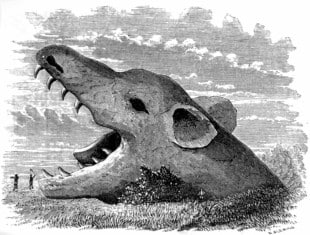
98. Varg, wolf, Geri,
watcher, grey-beast,
Hati, Hróðvitnir
and heathdweller,
Freki and forest-dweller,
Fenrir, leopard,
Goth, worthy, noisemaker,
howler, fighter,
dusky and dreadful
and swarthy-cheeked.
99. And [she] is called thus:
she-wolf, she-varg,
barker and grey-girl,
… lightheadedness.
Heavens
100. Nine are there heavens
named on high.
I know the lowest,
that is Vindbláinn (wind-dark),
that is Heiðþyrnir (the welkin)
and Hregg-Mímir (storm-Mímir),
the second is called
Andlangr (extended) Heaven,
that you may understand,
the third Víðbláinn (wide-dark),
Víðfeðmi (wide-embracer) I say
to be the fourth,
Hrjóðr (coverer) and Hlýrni (twilighted)
I believe the sixth,
Gimir (fiery or jeweled), Vetmímir (winter-Mímir),
I guess now there are
eight heavens
recounted,
Skattyrnir (rich-wetter) stands
above the clouds,
it is outside
all the worlds.
The Sun
101. Sól and sun,
shine, fair disk,
lightning, cover, plaything,
healing light, disk,
lightning, doubt-disk
and light-bringer,
driving, elf-glory
and Dvalin’s plaything.
Featured Image Credit: Unknown author, Public domain, via Wikimedia Commons
